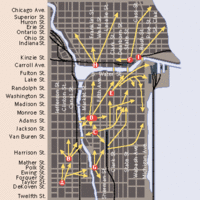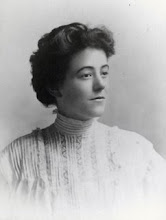
The parched summer and early autumn of 1871 around the Great Lakes foreshadowed the ghastly events of the weekend of October 7-9. Some theorize that sparks from a comet touched off fires all over the Midwest, but the more probable cause was extreme dryness in which the tiniest ember might launch Armageddon. So it was on the night of October 8 on Chicago’s west side in the barn belonging to the O’Learys. (Cow’s rights activists have long resisted the defamatory association of the O’Leary cow and the Great Chicago Fire. The only witness for the story was the neighborhood liar. )
The deadliest fire in US history, however, occurred on the very same weekend in Peshtigo, Wisconsin, where almost 1200 people died. In addition across the lake over one million acres burned from Holland on Lake Michigan’s eastern shore to Saginaw Bay on Lake Huron.
Many insurance companies were bankrupted as a result. One Chicago underwriter, Gurdon Saltonstall Hubbard, eventually paid all the claims against his company. There were around 200 companies with exposure, and only about 50 of them paid claims in full.
After the fire tens of thousands were left homeless, and the city's gentry were scared out of their wits. Angry mobs aren't known for level-headedness or deferring to their "betters." The mayor of Chicago decided not to ask for federal troop assistance to deal with the problem. However, the monied elite went around him, and as a result, Fort Sheridan** was constructed about 30 miles north of the city specifically to be a nearby aid to putting down any "insurrections". Armories started to be built within cities at this time, as well. They were fortresses for quartereing troops and stockpiling munitions - to be used against the citizenry.
(**It was closed when the Cheney defense department in early 1990s was punishing the taxpaying liberal [That's a redundant description folks.] northern states.)

No comments:
Post a Comment